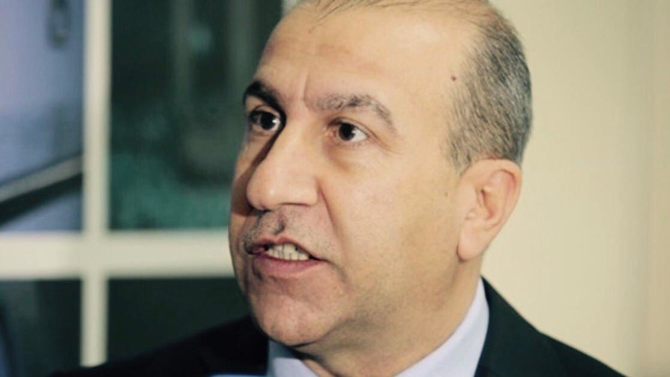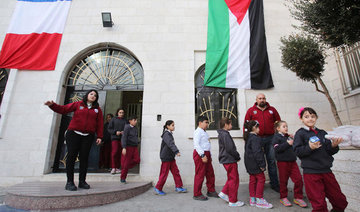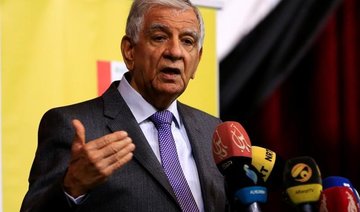BAGHDAD: The Iraqi Shiite-dominated Popular Mobilization Forces (PMF) will not be incorporated or dissolved, but will be restructured in line with military laws and regulations to ensure that fighters are free of ideological, political and partisan affiliations, Iraqi government spokesman Saad Al-Hadithi told Arab News on Sunday.
“According to the law approved by the Parliament, we have only one mechanism to resolve this case by issuing instructions and regulations to reorganize the work of the PMF,” said Al-Hadithi.
“This issue (the fate of the PMF) is resolved. The law authorized the prime minister to issue the required regulations to restructure this institution and reactivate its work in line with Iraqi law and submit it to the military regulations applied in all the Iraqi military institutions.
“(Resolving) this case is linked to the restructuring measures and (when it is) fully implemented on the ground, and this is what is currently being worked out with the participation of military specialists authorized to make (the required) decisions and representatives of the PMF,” Al-Hadithi, said.
Iraqi Prime Minister Haider Abadi last week declared the full liberation of the Iraqi territories seized by Daesh in the summer of 2014 after the collapse of the Iraqi army. Tens of thousands of Iraqis volunteered to fight Daesh and stop their advance on the capital.
The volunteers, mostly Shiite, have fought the militants alongside the government under the umbrella of the Popular Mobilization Units (PMU), a governmental body established by former Iraqi Prime Minister Nuri Al-Maliki to cover the armed factions who fought Daesh.
Although the PMU consists of tens of thousands of Shiite, Sunni, Turkmen, Christian and Yazidi volunteers, the Shiite militias have represented the backbone of PMF troops.
To subject PMF to the control of the government, the Iraqi Parliament voted on the law late in 2016. The law states that the PMF is a part of the regular Iraqi security establishment and subject to military laws and commanded directly by the commander-in-chief of the armed forces (the prime minister), who is fully responsible for arming, financing and equipping them.
PMF commanders and security officials contacted by Arab News confirmed that talks on the restructuring of the PMU had started weeks ago between the Iraqi Ministry of Defense and the commanders of the PMF.
Al-Hadithi said that as long as the PMF was a part of the Iraqi security establishment, “they must be fully subject to the will and decision of the commander-in-chief of the armed forces and central security institutions.”
The number of registered fighters on the payroll of the PMF is 120,000. Shiite-armed factions have played a key role in the three-year fight against Daesh.
The Iraqi government spokesmen said that all armed factions, individuals and parties that had fought Daesh alongside the government and were formally covered by the PMF, have no option but to legalize their existence and give up their political and ideological affiliations. This was “fundamental” for the work of the PMF, and the government was “fully keen to implement this.”
Al-Hadathi said that the commanders of the armed factions in the PMF had expressed their commitment to keep working under the umbrella of the PMF and to dismantle any political or ideological ties between the fighters and their parent organizations.
“Actually, the announced situations (of the commands of the Shiite-armed factions within PMF) related to this issue (to abandon affiliations), all have poured in this direction.
“We hope that there will be an understanding of the government’s position at this time and the necessity of taking this step during the next stage. The situations were all positive and we look forward to translating these positions into action,” Al-Hadithi said.
Al-Hadithi said that although there was no time limit to achieve this goal, the government was keen to accomplish it “as soon as possible.”
The Iraqi government estimated the cost of reconstruction and rehabilitation of the areas affected by terrorism, and the military operations to terminate the militants, at $100 billion. The support of the international community is vital for the Iraqi government to secure these funds, mainly by attracting foreign investment and donations from the international community.
“We look forward to bringing investors and international companies to work in Iraq. The existence of any armed manifestations outside the framework of state institutions sends a negative message (for the international community).
“The Iraqi government cannot alone provide the required funds of reconstruction and provide the basic services. Therefore, it is necessary to obtain international aid through (the recruitment) of major investment companies ... which can provide hundreds of thousands of jobs.
“Any step taken by any side that contradicts the will of the government to disarm (the armed factions) will damage the economy, the peace and security of the community and will negatively impact investment opportunities in Iraq.
“The Iraqi government will confront any armed faction operating outside the official system of the state, and will take all necessary legal measures to prevent its activity regardless of its title (name or affiliation),” Al-Hadithi said.
Iraqi mobilization forces will not be incorporated or dissolved: govt spokesman
Iraqi mobilization forces will not be incorporated or dissolved: govt spokesman

Netanyahu appoints adviser with Trump ties to lead ceasefire talks
- The US-born Ron Dermer is a Cabinet minister who’s widely seen as Netanyahu’s closest adviser.
- Dermer currently serves as Israel’s strategic affairs minister
The US-born Ron Dermer is a Cabinet minister who’s widely seen as Netanyahu’s closest adviser. He previously served as Israel’s ambassador to the US and is a former Republican activist with strong ties to the Trump White House.
Israel and Hamas have yet to negotiate a second and more difficult phase of the ceasefire, and the first ends in early March. Palestinians and Arab countries have universally rejected US President Donald Trump’s proposal to remove the Palestinian population from Gaza and take over the territory.
Since the war in Gaza was sparked by Hamas’ attack on Oct. 7, 2023, more than 50,000 people have died in Gaza and Lebanon and nearly 70 percent of the buildings in Gaza have been devastated, according to health ministries in Gaza and Lebanon. Around 1,200 people were killed in Israel during the Oct. 7 attack.
Here’s the latest:
Netanyahu appoints close adviser with Trump ties to lead ceasefire negotiations
An Israeli official said that Prime Minister Benjamin Netanyahu has appointed a close confidant to lead negotiations for the second stage of the ceasefire with Hamas.
The official says that Cabinet Minister Ron Dermer will head the Israeli team. Previous talks have been led by the heads of the Mossad and Shin Bet security agencies.
Talks have not yet started on the second stage, which is meant to include an end to the war, return of all hostages and Israeli pullout from Gaza.
The official spoke on condition of anonymity because the appointment has not been officially announced.
The US-born Dermer is widely seen as Netanyahu’s closest adviser. He previously served as Israel’s ambassador to the US and is a former Republican activist with strong ties to the Trump White House.
Dermer currently serves as Israel’s strategic affairs minister, where he has been a key player in relations with the US as well as Gulf Arab countries.
Tens of thousands of Palestinians flee West Bank refugee camps

- The camps, built for descendants of Palestinian refugees who fled or were driven from their homes in the 1948 war around the creation of the state of Israel, have long been major centers for armed militant groups
JERUSALEM: Tens of thousands of Palestinians living in refugee camps in the occupied West Bank have left their homes as a weeks-long Israeli offensive has demolished houses and torn up vital infrastructure in the heavily built up townships, Palestinian authorities said.
Israeli forces began their operation in the refugee camp in the northern West Bank city of Jenin on Jan. 21, deploying hundreds of troops and bulldozers that demolished houses and dug up roads, driving almost all of the camp’s residents out.
“We don’t know what’s going on in the camp but there is continuous demolition and roads being dug up,” said Mohammed Al-Sabbagh, head of the Jenin camp services committee.

The operation, which Israel says is aimed at thwarting Iranian-backed militant groups in the West Bank, has since been extended to other camps, notably the Tulkarm refugee camp and the nearby Nur Shams camp, both of which have also been devastated. The camps, built for descendants of Palestinian refugees who fled or were driven from their homes in the 1948 war around the creation of the state of Israel, have long been major centers for armed militant groups. They have been raided repeatedly by the Israeli military but the current operation, which began as a ceasefire was agreed in Gaza, has been on an unusually large scale. According to figures from the Palestinian Authority, around 17,000 people have now left Jenin refugee camp, leaving the site almost completely deserted, while in Nur Shams 6,000 people, or about two thirds of the total, have left, with another 10,000 leaving from Tulkarm camp.
“The ones who are left are trapped,” said Nihad Al-Shawish, head of the Nur Shams camp services committee. “The Civil Defense, the Red Crescent and the Palestinian security forces brought them some food yesterday but the army is still bulldozing and destroying the camp.” The Israeli raids have demolished dozens of houses and torn up large stretches of roadway as well as cutting off water and power, but the military has denied forcing residents to leave their homes.
“People obviously have the possibility to move or go where they want, if they will. But if they don’t, they’re allowed to stay,” Lt. Col. Nadav Shoshani told reporters.
The operation began as Israel moved to banish the main UN Palestinian relief organization UNRWA from its headquarters in East Jerusalem and cut it off from any contact with Israeli officials.
The ban, which took effect at the end of January, has hit UNRWA’s work in the West Bank and Gaza, where it provides aid for millions of Palestinians in the refugee camps.
Israel has accused UNRWA of cooperating with Hamas and said some UNRWA workers even took part in the Hamas-led attack on communities in southern Israel on Oct. 7, 2023 that set off the 15-month war in Gaza.
Tens of thousands of Palestinians flee West Bank refugee camps

- The camps, built for descendants of Palestinian refugees who fled or were driven from their homes in the 1948 war around the creation of the state of Israel, have long been major centers for armed militant groups
JERUSALEM: Tens of thousands of Palestinians living in refugee camps in the occupied West Bank have left their homes as a weeks-long Israeli offensive has demolished houses and torn up vital infrastructure in the heavily built up townships, Palestinian authorities said.
Israeli forces began their operation in the refugee camp in the northern West Bank city of Jenin on Jan. 21, deploying hundreds of troops and bulldozers that demolished houses and dug up roads, driving almost all of the camp’s residents out.
“We don’t know what’s going on in the camp but there is continuous demolition and roads being dug up,” said Mohammed Al-Sabbagh, head of the Jenin camp services committee.

The operation, which Israel says is aimed at thwarting Iranian-backed militant groups in the West Bank, has since been extended to other camps, notably the Tulkarm refugee camp and the nearby Nur Shams camp, both of which have also been devastated. The camps, built for descendants of Palestinian refugees who fled or were driven from their homes in the 1948 war around the creation of the state of Israel, have long been major centers for armed militant groups. They have been raided repeatedly by the Israeli military but the current operation, which began as a ceasefire was agreed in Gaza, has been on an unusually large scale. According to figures from the Palestinian Authority, around 17,000 people have now left Jenin refugee camp, leaving the site almost completely deserted, while in Nur Shams 6,000 people, or about two thirds of the total, have left, with another 10,000 leaving from Tulkarm camp.
“The ones who are left are trapped,” said Nihad Al-Shawish, head of the Nur Shams camp services committee. “The Civil Defense, the Red Crescent and the Palestinian security forces brought them some food yesterday but the army is still bulldozing and destroying the camp.” The Israeli raids have demolished dozens of houses and torn up large stretches of roadway as well as cutting off water and power, but the military has denied forcing residents to leave their homes.
“People obviously have the possibility to move or go where they want, if they will. But if they don’t, they’re allowed to stay,” Lt. Col. Nadav Shoshani told reporters.
The operation began as Israel moved to banish the main UN Palestinian relief organization UNRWA from its headquarters in East Jerusalem and cut it off from any contact with Israeli officials.
The ban, which took effect at the end of January, has hit UNRWA’s work in the West Bank and Gaza, where it provides aid for millions of Palestinians in the refugee camps.
Israel has accused UNRWA of cooperating with Hamas and said some UNRWA workers even took part in the Hamas-led attack on communities in southern Israel on Oct. 7, 2023 that set off the 15-month war in Gaza.
More than one million Syrians return to their homes: UN

- “Since the fall of the regime in Syria we estimate that 280,000 Syrian refugees and more than 800,000 people displaced inside the country have returned to their homes,” Filippo Grandi, the UN High Commissioner for Refugees
GENEVA: More than one million people have returned to their homes in Syria after the overthrow of Bashar Assad, including 280,000 refugees who came back from abroad, the UN said on Tuesday.
Assad was toppled in December in a rebel offensive, putting an end to his family’s decades-long grip on power in the Middle Eastern country and bookmarking a civil war that broke out in 2011, with the brutal repression of anti-government protests.
Syria’s war has killed more than half a million people and displaced millions from their homes.
The Islamist-led rebels whose offensive ousted Assad have sought to assure the international community that they have broken with their past and will respect the rights of minorities.
“Since the fall of the regime in Syria we estimate that 280,000 Syrian refugees and more than 800,000 people displaced inside the country have returned to their homes,” Filippo Grandi, the UN High Commissioner for Refugees, wrote on the X social media platform.
“Early recovery efforts must be bolder and faster, though, otherwise people will leave again: this is now urgent!” he said.
At a meeting in Paris in mid-February, some 20 countries, including Arab nations, Turkiye, Britain, France, Germany, Canada and Japan agreed at the close of a conference in Paris to “work together to ensure the success of the transition in a process led by Syria.”
The meeting’s final statement also pledged support for Syria’s new authorities in the fight against “all forms of terrorism and extremism.”


















